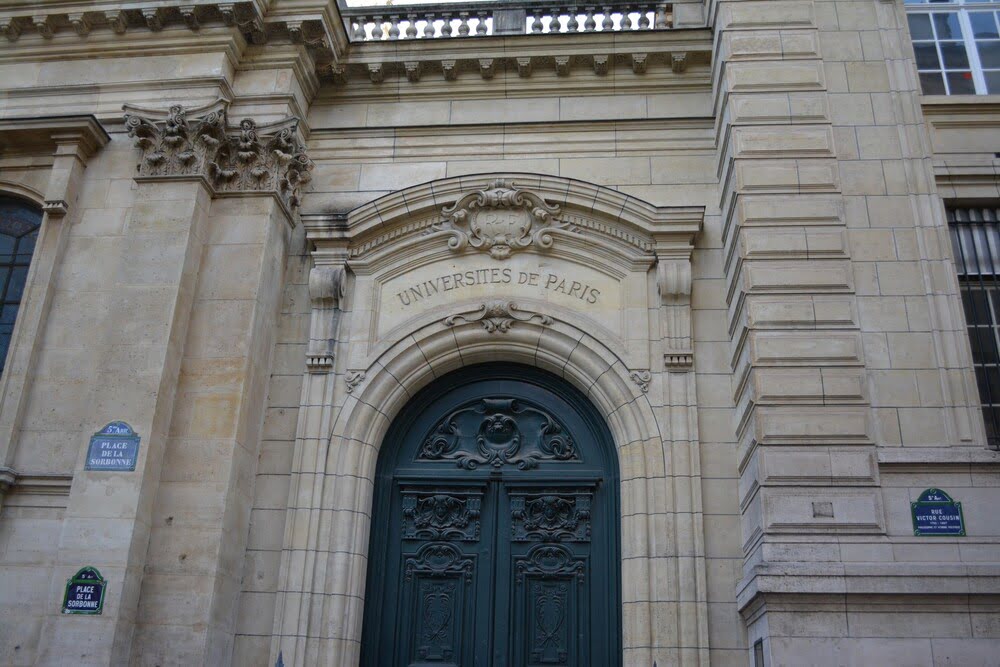- Paris Hotels
- Hotels by Category
- Hotels by Districts
- Champs Elysees Hotel
- Montmartre Hotel
- Saint Germain des Prés Hotel
- Montparnasse Hotel
- Porte de Versailles Hotel
- Republique – North Train Station Hotel
- Place de la Nation Hotel
- Latin Quarter Hotel
- Opera Garnier Hotel
- Marais – Bastille Hotel
- Gare de Lyon Hotel
- Gare Saint-Lazare Hotel
- Hotel Place d’Italie
- Other Hotels
- Hotels by Category
- Districts
- Paris map
- News
- Contact us
The Sorbonne
- Profile
- prev
- next
- prev
- next
-
The Sorbonne University is one of the oldest and most prestigious universities in France, with a history dating back to the 13th century.
The history of Sorbonne University
The university has its roots in the College of Sorbonne, founded by Robert de Sorbon in 1257, which was originally intended to train theologians and priests.
Over the centuries, the College of Sorbonne evolved into a major center of learning, attracting scholars and students from all over Europe. The Sorbonne played a central role in the development of French culture and intellectual life, and was closely associated with many of the most important figures in French history, such as Cardinal Richelieu, Victor Hugo, and Marie Curie.
In 1970, the Sorbonne was divided into several universities, but in 2018, several of these institutions were reunited under the name Sorbonne University. Today, Sorbonne University is a leading center of research and higher education, with a strong international reputation and a commitment to innovation and excellence.
The university is organized into several faculties and institutes, including humanities, social sciences, science and engineering, medicine, and business, and offers a wide range of programs at the undergraduate and graduate level. With its rich history, world-class faculty, and vibrant intellectual community, the Sorbonne University remains a premier destination for students and scholars from around the world.
Programs and Campuses of the Sorbonne
The Sorbonne University offers a wide range of programs in various fields, including humanities, social sciences, science and engineering, medicine, and business. The university has several faculties and institutes, each offering a unique range of courses and degrees :
- The Faculty of Humanities is one of the oldest and most prestigious faculties of the Sorbonne University, offering programs in fields such as history, philosophy, literature, languages, and art history. The faculty has a strong emphasis on research, and is home to several research centers and institutes.
- The Faculty of Social Sciences and Economics offers programs in fields such as sociology, political science, economics, and management. The faculty is known for its innovative research and teaching methods, and has a strong focus on practical applications of social science research.
- The Faculty of Science and Engineering offers programs in fields such as mathematics, physics, chemistry, biology, computer science, and engineering. The faculty is known for its cutting-edge research and facilities, and has a strong reputation for innovation and excellence.
- The Faculty of Medicine offers programs in various fields of medicine, including general medicine, dentistry, pharmacy, and biomedical research. The faculty is known for its high-quality training and research, and has a strong focus on translational research and medical innovation.
The Sorbonne University has several campuses in France and abroad, including Paris, Abu Dhabi, and Singapore. The Paris campus is located in the heart of the Latin Quarter, and is home to several faculties and institutes. The Abu Dhabi and Singapore campuses offer unique opportunities for international study and research, and are known for their innovative programs and facilities.
Admission to the Sorbonne
The admission process for the Sorbonne University varies depending on the program and level of study. Here is a general overview of the admission requirements and procedures:
Undergraduate Admission:
- Applicants must have a high school diploma or equivalent.
- Some programs require a certain level of proficiency in French or other languages.
- Admission is based on academic records and possibly an entrance exam or interview.
Graduate Admission:
- Some programs may require a certain level of proficiency in French or other languages.
- Admission is based on academic records, possibly letters of recommendation, a statement of purpose, and/or an entrance exam or interview.
International Student Admission:
- International students must meet the same admission requirements as domestic students.
- International students may need to provide additional documentation, such as proof of language proficiency and a student visa.
Admission to the Sorbonne University is competitive, and meeting the minimum requirements does not guarantee admission. The selection criteria may vary by program and level of study, but generally include academic records, language proficiency, motivation and potential, and possibly other factors such as work experience and extracurricular activities.
The Sorbonne in the World
The Sorbonne University has a strong international presence, with partnerships and collaborations with institutions around the world. The university has a dedicated Office of International Relations, which is responsible for promoting and facilitating internationalization and cooperation:
- Study Abroad Programs: The Sorbonne University offers a variety of study abroad programs for students, allowing them to study at partner universities around the world. These programs may include exchange programs, joint degree programs, or short-term study abroad programs.
- Research Collaborations: The Sorbonne University has partnerships and collaborations with institutions around the world for research and academic exchange. The university is involved in various international research projects and networks, and actively seeks to promote cross-disciplinary and international collaborations.
- Global Campus Network: The Sorbonne University has established a network of campuses around the world, including campuses in Abu Dhabi and Singapore. These campuses offer unique opportunities for students and researchers to study and collaborate in different cultural and academic environments.
- Language Programs: The Sorbonne University is known for its expertise in the French language and culture, and offers various language programs and resources for students and professionals around the world. The university also has partnerships with institutions offering language and cultural immersion programs in France.
The Sorbonne University is committed to promoting internationalization and cooperation, and seeks to provide its students and faculty with opportunities to study and collaborate in a global context.
Location: 1 Rue Victor Cousin 75005 Paris
Phone: 01 40 46 22 11
Official website: https://lettres.sorbonne-universite.fr/faculte/histoire-de-la-faculte
-
1 Rue Victor Cousin, 75005 Paris, France
Nearby hotels
-
14 Rue Stanislas, 75006 Paris, France
-
32 Rue des Saints-Pères, 75007 Paris, France
-
21 Rue de Penthièvre, 75008 Paris, France






